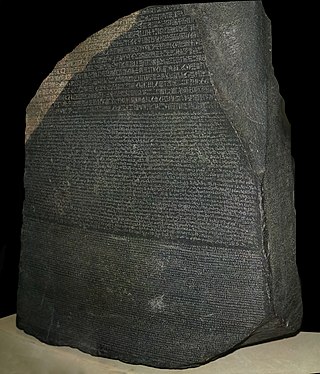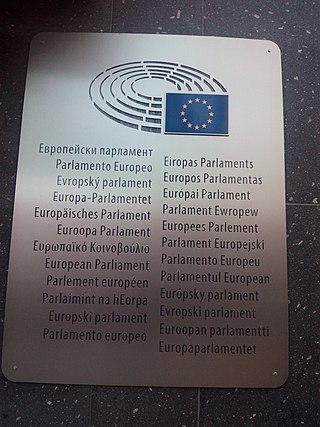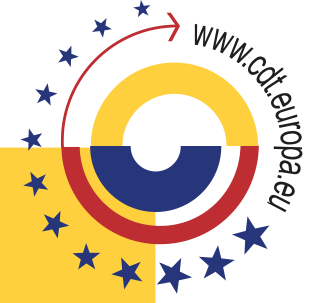
The European Economic Community (EEC) was a regional organisation created by the Treaty of Rome of 1957, aiming to foster economic integration among its member states. It was subsequently renamed the European Community (EC) upon becoming integrated into the first pillar of the newly formed European Union (EU) in 1993. In the popular language, the singular European Community was sometimes inaccurately used in the wider sense of the plural European Communities, in spite of the latter designation covering all the three constituent entities of the first pillar. The EEC was also known as the European Common Market (ECM) in the English-speaking countries, and sometimes referred to as the European Community even before it was officially renamed as such in 1993. In 2009, the EC formally ceased to exist and its institutions were directly absorbed by the EU. This made the Union the formal successor institution of the Community.

A parallel text is a text placed alongside its translation or translations. Parallel text alignment is the identification of the corresponding sentences in both halves of the parallel text. The Loeb Classical Library and the Clay Sanskrit Library are two examples of dual-language series of texts. Reference Bibles may contain the original languages and a translation, or several translations by themselves, for ease of comparison and study; Origen's Hexapla placed six versions of the Old Testament side by side. A famous example is the Rosetta Stone, whose discovery allowed the Ancient Egyptian language to begin being deciphered.

The European Court of Auditors is the supreme audit institution of the European Union (EU). It was established in 1975 in Luxembourg and is one of the seven EU institutions. The Court comprises one member from each EU member state supported by approximately 800 civil servants.

The Official Journal of the European Union is the official gazette of record for the European Union (EU). It is published every working day in all of the official languages of the member states of the EU. Only legal acts published in the Official Journal are binding.

EUR-Lex is the official online database of European Union law and other public documents of the European Union (EU), published in 24 official languages of the EU. The Official Journal (OJ) of the European Union is also published on EUR-Lex. Users can access EUR-Lex free of charge and also register for a free account, which offers extra features.

The European Union (EU) has 24 official languages, of which three – English, French and German – were considered "procedural" languages but this notion was abandoned by the European Commission. In fact English and French are used in the day-to-day workings of the institutions of the EU. Institutions have the right to define the linguistic regime of their working but the Commission and a number of other institutions did not do this as indicated by several Court judgments
Eurodicautom was the pioneering terminology database of the European Commission, created in 1975, initially for use by translators and other Commission staff. By 1980 it was consultable on line within the Commission. As the European Community grew it was expanded from six to seven, nine and finally eleven languages. Public user interfaces were added later, providing the general public with free access to multilingual terminology in the fields of activity of the European Union. The students of Rennes University UFR2, LEA, technical translator and terminologist department, regularly worked on reviewing and creating entries to the existing database in several languages.
Computer-aided translation (CAT), also referred to as computer-assisted translation or computer-aided human translation (CAHT), is the use of software, also known as a translator, to assist a human translator in the translation process. The translation is created by a human, and certain aspects of the process are facilitated by software; this is in contrast with machine translation (MT), in which the translation is created by a computer, optionally with some human intervention.

The institutions of the European Union are the seven principal decision-making bodies of the European Union and Euratom governed under the Treaties of the European Union and European Union law. They are, as listed in Article 13 of the Treaty on European Union:

The Directorate-General for Translation (DGT) translates texts for the European Commission into and out of the EU's 24 official languages, and a few others when needed. The department deals exclusively with written texts.
The Committee on Budgetary Control (CONT) is a committee of the European Parliament. with 30 permanent members. It can be seen as the European Union's internal "political watchdog", seeking to identify undesirable developments within EU institutions and other bodies and then to elaborate constructive suggestions for improvement.

The Translation Centre for the Bodies of the European Union (CdT) is an EU agency based in Luxembourg City. Its primary role is to cater for the diverse multilingual communication needs of the EU agencies and other EU bodies. In addition, it may be called upon by the EU institutions to absorb any surplus work they may have.

The budget of the European Union is used to finance EU funding programmes and other expenditure at the European level.

Pootle is an online translation management tool with a translation interface. It is written in the Python programming language using the Django framework and is free software originally developed and released by Translate.org.za in 2004. It was further developed as part of the WordForge project and the African Network for Localisation and is now maintained by Translate.org.za.

EuroVoc is a multilingual thesaurus maintained by the Publications Office of the European Union and hosted on the portal Europa. It exists in the 24 official languages of the European Union plus Albanian, Macedonian and Serbian, although the user interface is not yet available in these languages.

The European Union employs a variety of public accountability measures to review and reform budgets across government. As the EU's budget is at risk of maladministration, every year the Court of Auditors reports on the management of the budget. European Union auditors have stated that as they implement more transparency and double-entry book-keeping systems, it is likely to improve budget management.
memoQ is a proprietary computer-assisted translation software suite which runs on Microsoft Windows operating systems. It is developed by the Hungarian software company memoQ Fordítástechnológiai Zrt., formerly Kilgray, a provider of translation management software established in 2004 and cited as one of the fastest-growing companies in the translation technology sector in 2012, and 2013. memoQ provides translation memory, terminology, machine translation integration and reference information management in desktop, client/server and web application environments.
The Terminology Coordination Unit (TermCoord) is a supporting unit to the translation units of the Directorate-General for Translation of the European Parliament. TermCoord was created in 2008 by Rodolfo Maslias, professor at the Universities Luxembourg and Savoie-Mont Blanc, to stimulate and coordinate the terminology work of the 24 translation units of the European Parliament in Luxembourg.
TermBase eXchange (TBX) is an international standard for the representation of structured concept-oriented terminological data, copublished by ISO and the Localization Industry Standards Association (LISA). Originally released in 2002 by LISA's OSCAR special interest group, TBX was adopted by ISO TC 37 in 2008. In 2019 ISO 30042:2008 was withdrawn and revised by ISO 30042:2019. It is currently available as an ISO standard and as an open, industry standard, available at no charge.
Euro English, Euro-English, or European English, less commonly known as EU English, Continental English, and EU Speak, is a group of dialects of the English language and a form of International English as used in Europe based on common lexical and grammatical mistranslations influenced by the native languages of its non-native English-speaking population mostly built on the technical jargon of the European Union (EU) and the European Free Trade Association (EFTA). It is mostly used among EU staff, EFTA staff, expatriates and migrants from EU and EFTA countries, global nomads and young international travelers such as international students in the EU's Erasmus programme, as well as European diplomats with a lower proficiency in English inclusive of both Standard English and non-standard native speaker dialects of English.








